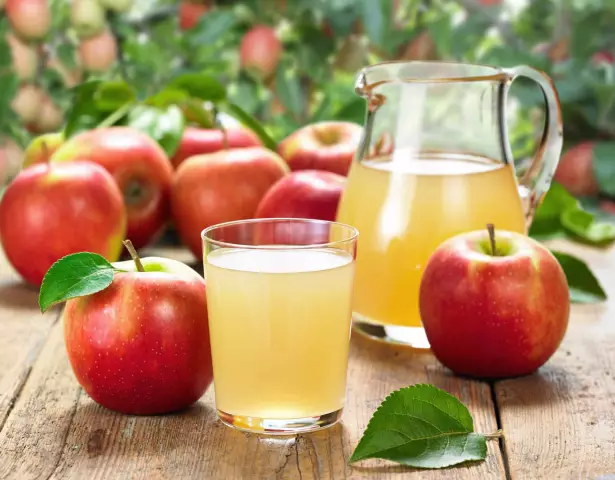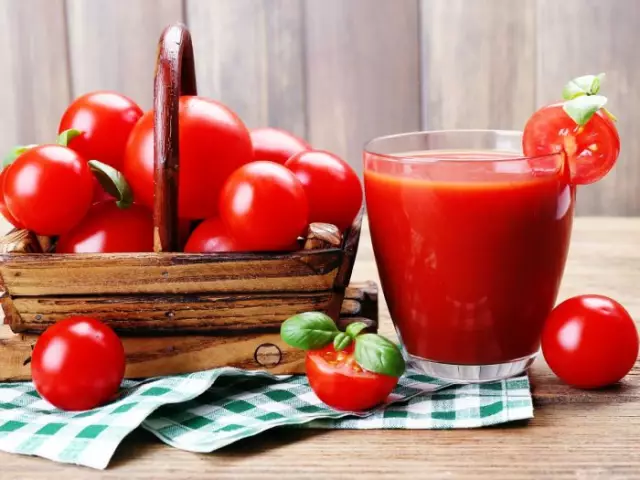- Author Rachel Wainwright wainwright@abchealthonline.com.
- Public 2023-12-15 07:39.
- Last modified 2025-11-02 20:14.
Apple juice
In our country, apple juice is one of the most beloved and popular juices. It is not only very healthy and tasty, but also widely available. Indeed, in our latitudes, apples grow literally everywhere, and of a wide variety of varieties.

An apple is rightfully considered by many peoples of the world to be one of the most useful fruits. Today, probably, there is no country where apples are not grown. The taste of apples and juice from them depends on the growing conditions and variety. The taste of the fruit is given by organic acids, tannins and sugars, and the aroma of different varieties differs depending on the content of essential oils.
Apple juice composition
In addition to its incredible taste and aroma, apple juice contains a whole range of nutrients and useful substances such as sugars, carbohydrates and organic acids, as well as fiber, proteins, starch and fats. Even alcohol is present in small quantities.
Apples contain a lot of ascorbic acid, as well as vitamins E, PP, H and B vitamins. And there are more minerals in apple juice than in other fruits and juices. There is zinc, iron, copper, iodine, magnesium, calcium, phosphorus, sodium, potassium, manganese, molybdenum, chromium, vanadium, boron, chlorine, sulfur, aluminum, cobalt, nickel, rubidium.
Calorie content of apple juice
We can safely say that it is simply impossible to get better from this product, since the calorie content of apple juice is only 47 kcal per 100 g of product.
The benefits of apple juice
Due to the high combination of nutrients, apple juice is used for diseases of the stomach, liver, kidneys, intestines and bladder. It's not for nothing that pediatricians advise regularly giving apple juice to children.
Apples contain pectin, which quickly normalizes the stomach. In addition, the benefits of apple juice are in the effects on brain cells. It protects brain cells from destruction and is an excellent prevention against such a dangerous disease as Alzheimer's disease.
A number of experiments were carried out on mice, and they all showed that apple juice perfectly protects brain cells from oxidative processes that are activated during stress, which indicates the powerful antioxidant properties of the juice. It is enough to drink 300 ml of juice daily to protect yourself from the development of sclerosis of the cerebral vessels.
Due to the presence of organic acids and natural sugars, the benefits of apple juice are to strengthen blood vessels and the heart and restore the body after heavy exertion. Apple juice is very useful for children, as a growing body needs constant vitamins and minerals. And for constipation and gastritis with low acidity, juice from sour apples is an excellent remedy.
Doctors recommend drinking apple juice for children with vitamin deficiency, anemia. And for adults, it will be useful after a heart attack and other serious illnesses.
Regular consumption of apple juice protects the body from radiation, normalizes heart function and lowers blood cholesterol levels. Freshly squeezed apple juice has a diuretic and choleretic effect, increases vitality, strengthens the immune system, refreshes and quenches thirst, is an excellent prevention against the formation of kidney stones.
With gout, atherosclerosis, metabolic disorders and high mental stress, apple juice supports the body and makes it healthy. Apple juice also benefits from killing germs and improving sleep. In addition, it is excellent at eliminating the effects of overeating.
For diabetes mellitus, it is better to use juice squeezed from green apples.
Applying apple juice

Apple juice is widely used in cooking. It is used to prepare drinks, jellies, mousses, sauces, jelly and gravies. Apple juice is often added to various cocktails and sorbets.
There are many recipes for using apple juice in traditional medicine. So, to dissolve stones and sand in the gallbladder, do the following: for three days, drink 2 full glasses of juice every two hours every day. They start drinking juice from 8 am with one glass, and every two hours they drink two glasses until 8 pm inclusive.
At the same time, they do not consume any food other than juice. If there is no stool, then in the evening before going to bed, you must take an infusion of laxative herbs, or make an enema with warm water. This method of getting rid of gallstones is quite difficult, but very effective. Of course, such treatment should be done only with the permission of the attending physician.
For constipation, they drink one glass of apple juice before each meal, and the juice of oven apples relieves pain in gout.
Apple juice is used not only in cooking and traditional medicine, but also in cosmetology. For example, face masks are made on its basis, which relieve skin redness.
The harm of apple juice
Like any other juice, apple juice should not be overused either. If consumed excessively, it can cause an unpleasant feeling of heaviness in the stomach, bloating and increased gas production, as well as irritation of the mucous membranes.
In the presence of chronic diseases, the harm of apple juice will be obvious. In particular, this applies to people with cholecystitis, hepatitis, inflammatory diseases of the gastrointestinal tract and intestines.
In addition, do not consume too much undiluted juice, but rather dilute it with water or other juices: beet, carrot, grape, pumpkin, peach and others.
Harm from apple juice can be with diseases such as gastritis, stomach and duodenal ulcers, pancreatitis.
Found a mistake in the text? Select it and press Ctrl + Enter.






